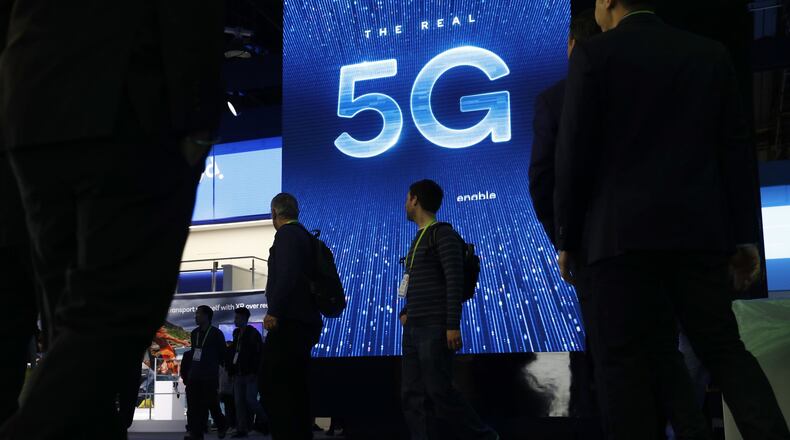Cities from Boston to Dallas to Portland are in the middle of a legal fight with the federal government over emerging wireless 5G technology. Here in Georgia, Brookhaven and Atlanta are joining them and dozens of other large and small cities in a lawsuit against the Federal Communications Commission.
Arguments in the case are expected to kick off Monday in Pasadena, California. But why exactly are two metro Atlanta governments part of this battle?
“The FCC has determined that they know what’s best for a local government, whether it be the city of Brookhaven, San Jose, Los Angeles,” Brookhaven Mayor John Ernst said Thursday on a call with reporters.
The disagreement all stems from 5G, the wireless internet technology that is believed to be up to 10 times faster than cellphones running on existing 4G LTE networks. Telecommunication companies like Sprint and Verizon began deploying the tech last year, offering faster internet service for phones and computers. In the Atlanta area, Sprint, Verizon and AT&T have launched 5G networks.
Why does it matter to cities and residents? The expansion of 5G in a neighborhood involves the use of public property, and cities collect a fee for that access. That's because companies need to install equipment called "small cells" on public utility poles. They are wireless transmitters and receivers about the size of a mini-fridge. You might have seen some propped atop poles in your community.
So what does the FCC think? Under Chairman Ajit Pai, who was designated as head of the agency by President Trump, the commission is all in on 5G. In 2018, it passed orders intended to accelerate 5G expansion and reduce barriers for telecom companies.
The new rules limit the fees that cities can charge telecom companies to install small cell devices on utility poles located on public right-of-ways: No more than $100 for the application fee, and $270 for the “annual attachment fee.” The FCC also gives cities a deadline to approve or deny applications for new small cell installations.
Why are the cities suing? They are trying to overturn the new orders because they feel like the federal government is overreaching and unfairly interfering with local affairs. The lawsuit also claims that local governments — and in turn, taxpayers — are losing out on millions of dollars because of the reduced installation fees.
Ernst said the fees instituted by the FCC are lower than market value for the use of public infrastructure.
“The FCC’s told us … how much our dirt is worth,” he said.
There are currently more than 30 small cells posted on poles around Brookhaven.
“It is less about the money, and more about the prospect of multiple ugly poles in a single block of a residential neighborhood,” City Manager Christian Sigman said. “The telecom companies hide behind federal regulations funded by the telecom lobbyists in Washington.”
Michael Smith, a spokesman for the city of Atlanta, said the city is involved in the lawsuit because the FCC rules “force the taxpayers of Atlanta to subsidize the multi-billion dollar phone and cable industry.”
The look of the devices is important for Atlanta, too.
“Both the Georgia and FCC rules limit the ability of the city of Atlanta to control the aesthetics of our city,” Smith said in a statement.
What is the FCC's argument? In an interview with Axios, Republican FCC Commissioner Brendan Carr said the agency's actions are constitutional because the law says state and local governments can't effectively prohibit the provision of wireless services. On its website, the FCC said "short-sighted municipal roadblocks" slow down 5G expansion. The agency did not respond to requests for comment on the lawsuit.
Wait, what is the state's role in all this? Last year, the Georgia General Assembly passed a bill creating statewide regulations for small cell installation. The legislation streamlines the process for telecom companies to expand 5G technology and compensates local governments. If the court reverses the FCC orders, however, Georgia's law would be overturned and would have to be renegotiated, according to Nancy Werner, an attorney for the National Association of Telecommunications Officers and Advisors who is working on the case against the FCC.
So, what's next? The case is in the U.S. Court of Appeals for the Ninth Circuit. Oral arguments begin Monday.
Wouldn’t you like to support our strong journalism? Your subscription helps us cover your communities in a way that no one else can. Visit https://subscribe.ajc.com/hyperlocal or call 404-526-7988 to begin or renew your subscription.
About the Author
Keep Reading
The Latest
Featured





